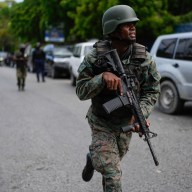RIO DE JANEIRO (Reuters) – A second bullet inside the Olympic equestrian center was found close to the stable area on Wednesday, the second time a stray shot has been picked up at the venue over the past week, police said. No one was injured and the first day of the dressage competition finished as normal.
On Saturday, a stray bullet tore through the roof of the equestrian press center, passing over the head of the New Zealand press attache and landing at the feet of a photographer.
The defense minister said it may have been fired by a gang member trying to shoot down a police blimp.
The police blimp, which carries cameras to monitor the surrounding area, was flying on Tuesday during the final day of the eventing competition.
Police arrested on Wednesday a man accused of firing the shot on Saturday in a community about two kilometers away from the venue, General Luis Ramos told reporters. During the arrest more shots were fired, possibly explaining the second bullet. A representative for the German equestrian team said they took the incident quite seriously but had been assured security forces would do whatever possible to protect horses and humans.
The Deodoro equestrian area is next to a military complex and riders and fans have heard gun shots periodically since competition began on Aug. 6.
Ramos confirmed the army had been conducting training exercises but promised to stop them so as not to spook the horses. He said 5,500 soldiers more were made available to provide additional security for the area in western Rio. The city had already pledged 85,000 police and military troops for the Games, more than double the figure employed in London in 2012.
In recent days, three Swedish tourists were briefly abducted when they visited a slum, Portugal’s visiting education minister was robbed at knifepoint, soldiers came under fire near the international airport and a Games bus was attacked with stones. (Reporting by Caroline Stauffer and Rodrigo Viga; Editing by Mark Bendeich and Mark Lamport-Stokes)


















